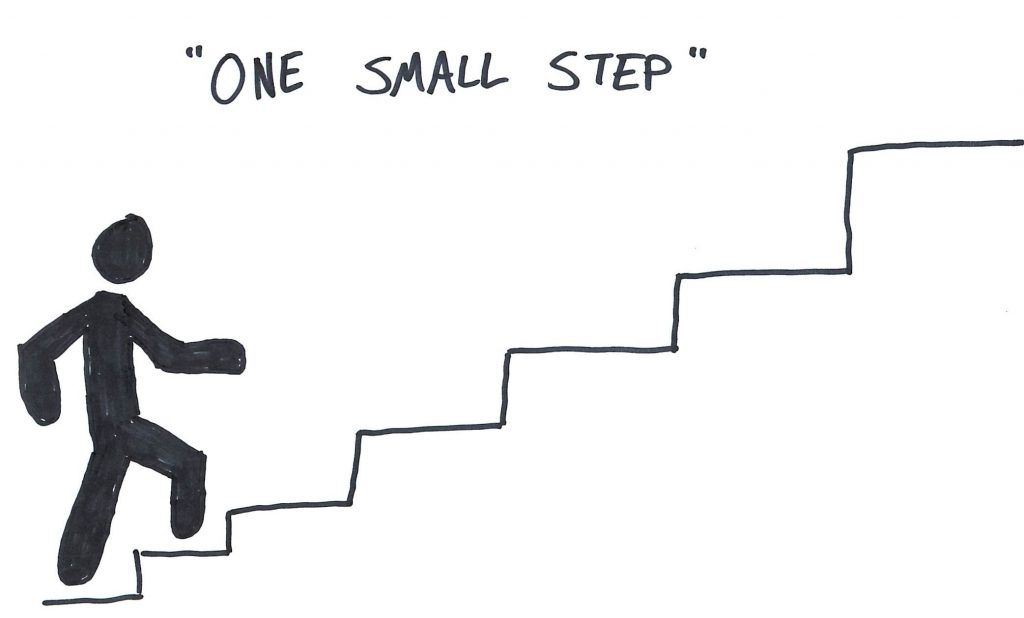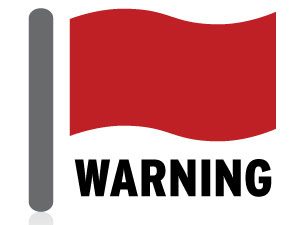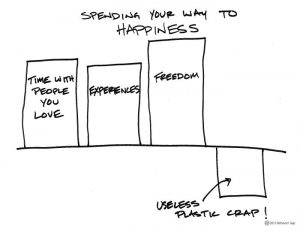by Ryan H. Law
When we decide we want to achieve a goal we usually get excited and want to jump in the deep end. For some people, this might work, but the majority of people are going to sink. Research has shown that taking really small steps can be the best way to achieve a goal.
Robert Maurer, author of “One Small Step Can Change Your Life” tells a story about a girl named Julie who needed to lose weight and get her blood pressure down. He was tempted to tell her to exercise aerobically for 30 minutes every day, but he knew from experience that while the advice was good, she was unlikely to do it and would just feel misunderstood and guilty.
Maurer decided to try something different. “How about if you just march in place in front of the television, each day, for one minute?” Julie responded that of course she could do that. After all, there was no way she couldn’t succeed.
Was she going to get healthier exercising for a minute a day? Probably not. What happened the next week, though, was that Julie came back excited that she had achieved her goal. Together they built up the exercise habit, minute by minute, for a few months, until she started exercising for 30 minutes each day.
If you set really small steps towards your goal you will achieve success over time. The steps should be so small that you are guaranteed success.

You should be setting goals in seven areas of your life:
- Work/career
- Mind/intellect
- Spiritual
- Physical/health
- Personal/social
- Family
- Financial
What is one small step (so small that you can’t fail) that will begin to move you forward? Here are a few ideas:
- I will march in place during one commercial
- At noon I will go on a five-minute walk
- At 8:00 in the morning I will read one verse in the Bible
- When I get home from work I will spend five minutes connecting with my spouse
- After dinner I will play with my children for three minutes
This process works the same for financial goals. We all hear the advice that we should pay ourselves (save) 10% first, but few people do it. If you aren’t saving any money right now, can you save just 1%? If that is too much, how about .5% (one-half of one percent)? Can you add .5% more to your 401(k)? Can you pay an extra $5 this month towards your debt?
Again, these steps seem so small that it seems they won’t make any difference. Starting small, then moving up from there, works!
Here’s an example. About 2.5 months ago I decided to start jogging 3 days a week. I haven’t been jogging in at least 10 years. I started a program where the first week looked like this:
- 60 seconds jogging
- 90 seconds walking
- Alternate for 20 minutes
Almost anyone can do that, right? If that sounds too hard you can decrease the jogging and increase the walking. The point is to increase, over time, the amount of time jogging and decrease the amount of time walking.
I’m on to a different program now where I run for four minutes then walk for one. My endurance and strength have built up and now I am running four miles in about 40 minutes, and that includes 10 minutes of warm-up and cool-down time.
Am I where I want to be, fitness-wise? Not quite, but I’m making progress. The name of the game is improvement, not perfection, and that applies to your money, your fitness, your family, and every other area.
Here’s my challenge to you:
- Pick one area from the seven areas of your life.
- Set a small goal – one you know you can’t fail at.
- Let me know what your goal is in the comments below or on Facebook or Linkedin.
If you found this helpful, I would appreciate it if you would share it with others using the links below!
Share this: However, after a while, we got restless. We wanted to own a home. After all, that is the American Dream, right? So we started looking for homes. We found a brand new community that was being built, and they offered 100% financing. We picked out a home we liked and put down some earnest money, then they started building it. What an exciting time!
However, after a while, we got restless. We wanted to own a home. After all, that is the American Dream, right? So we started looking for homes. We found a brand new community that was being built, and they offered 100% financing. We picked out a home we liked and put down some earnest money, then they started building it. What an exciting time! Another red flag was that we had no money for a down payment or closing costs. Of course, to the seller, that was no problem. They could just roll it all in to the loan.
Another red flag was that we had no money for a down payment or closing costs. Of course, to the seller, that was no problem. They could just roll it all in to the loan.